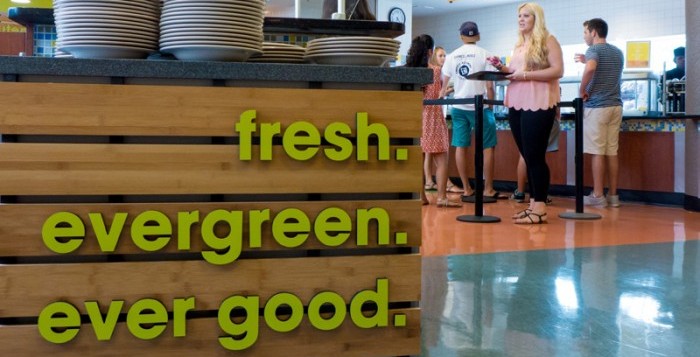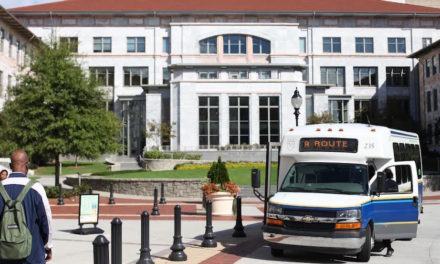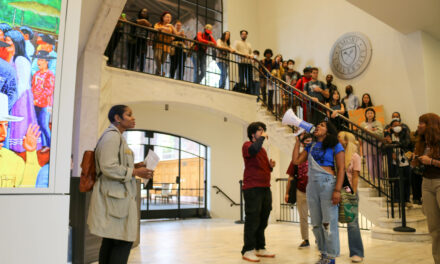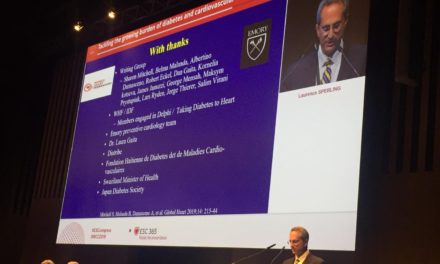By Annie McGrew
With aisles of colorful items from candy to laundry detergent, Eagle Convenience and Subs (EC) opened on Oct. 15 on the first floor of the Dobbs University Center (DUC) in a space that formerly housed the Faculty Dining Room.
The new dining option consists of a convenience store as well as a Subway-style sandwich station. EC offers both a late night and weekend meal option for students; the entire convenience store and subs station is open from 11 a.m. to midnight seven days a week, and the convenience store opens even earlier at 8 a.m. Monday through Friday.
Although it has only been open for a few days, EC has received overwhelmingly positive responses and feedback, according to Senior Director of the University Food Service Administration David Furhman in an email to the Wheel.
College sophomore Jessica Andrews said the new store “was pretty rad” and that she “wish[es] it was there when [she was a] freshman.”
The success of the Cox Convenience Corner (CCC) inspired the idea of introducing EC, according to Co-Chair of the Food Advisory Committee Emory (FACE) College senior Karoline Porcello. She noted that CCC was extremely successful but faced two limitations: space and hours of operation.
“EC solves both of these problems,” Porcello wrote in an email to the Wheel. “The large area allows us to stock more products and we are able to stay open until midnight seven days a week.”
“Students told us quite clearly that we were missing a critical component to the Campus Dining program – a convenience store,” Furhman wrote in the email.
Students were also enthusiastic about the extended hours of the store.
“I absolutely love it.” College freshman Gretel Nabeta said, “Yesterday I had an early dinner, and I was hungry at 11:30 and I was like, ‘I can’t walk to CVS, and I have nowhere to go to get food.’ Then I looked over and saw people going into the convenience store!”.
The store accepts both Dooley and Eagle Dollars; however, Dooley Dollars can only be used to purchase food items in the convenience store, according to Porcello. All other items (e.g. shampoo, shirts, etc.) can be purchased with Eagle Dollars, cash or credit.
According to Furhman, initial inventory at the store was based on students’ requests.
He wrote that the FACE Advisory Board was asked to submit a “wish list” of items they and their constituents would like to see.
The store also sells specialty items such as organic, gluten-free, vegan and vegetarian food and even has a microwave to heat up pre-made soups and meals.
“It’s really important to note that this is a work in progress,” wrote Furham, “We’ll be constantly updating offerings based on student and community feedback and demand.”
Porcello corroborated Furhman’s report that the store was doing well so far; however, she wrote that their biggest issue is publicity, stating that not all students know that the space is there. So far, they have been heavily relying on word of mouth.
“We’re hoping to increase awareness,” Porcello wrote. “[FACE is] actively seeking feedback because EC is for students, so we are trying to tailor it to best meet what students want.”
According to Porcello, FACE’s hope is that opening EC will continue to expand students’ food options late at night and on weekends.
“Students told us that’s what they wanted, so this year we have actively been trying to accommodate those desires,” Porcello wrote.
If students have any suggestions, FACE asks that they attend the next meeting on Thursday, Nov. 6 at 6 p.m. in Winship Ballroom. Porcello stated that this meeting will be a great forum for students to give FACE any feedback that they have on the store.
– By Annie McGrew, Contributing Writer
The Emory Wheel was founded in 1919 and is currently the only independent, student-run newspaper of Emory University. The Wheel publishes weekly on Wednesdays during the academic year, except during University holidays and scheduled publication intermissions.
The Wheel is financially and editorially independent from the University. All of its content is generated by the Wheel’s more than 100 student staff members and contributing writers, and its printing costs are covered by profits from self-generated advertising sales.






